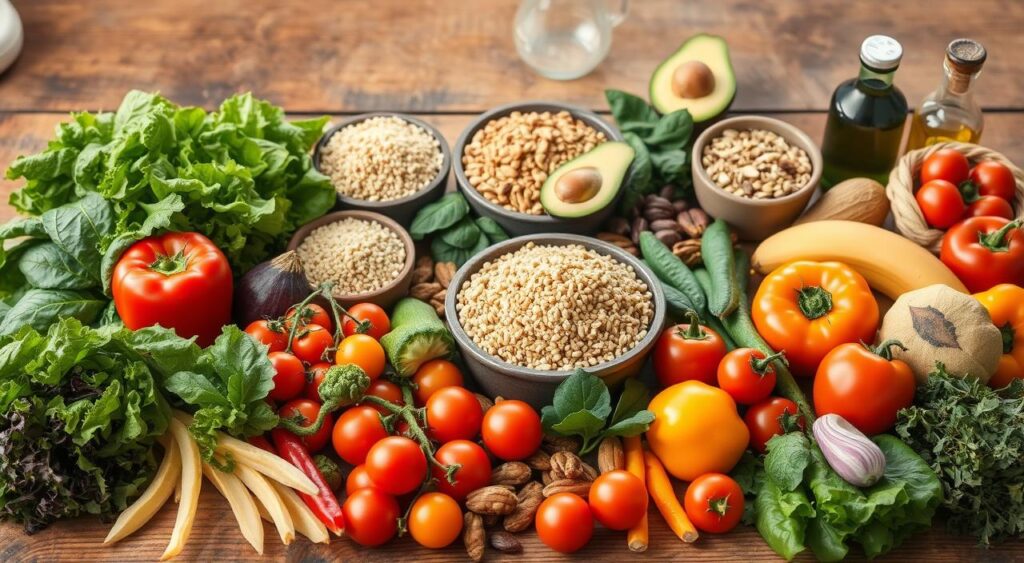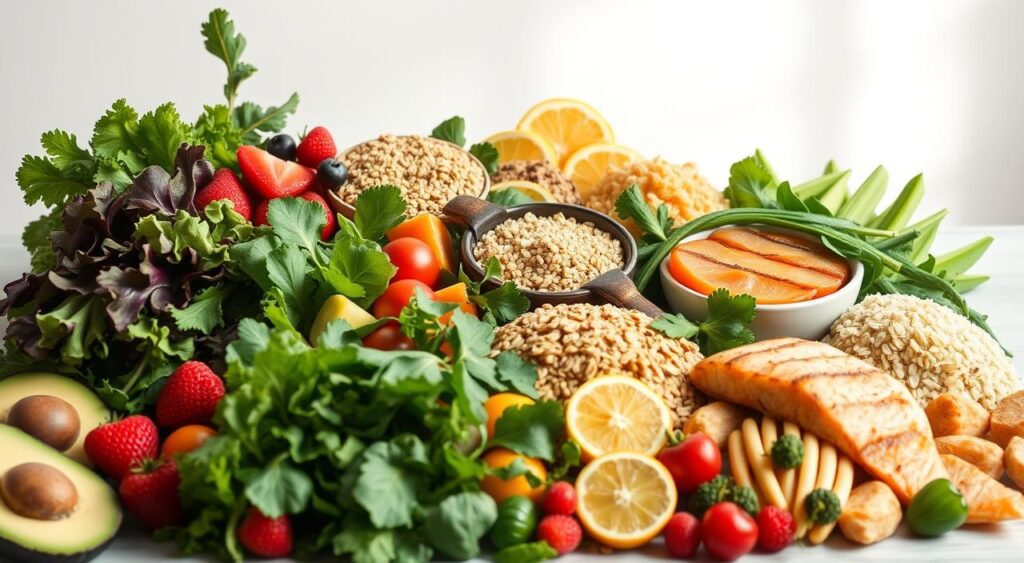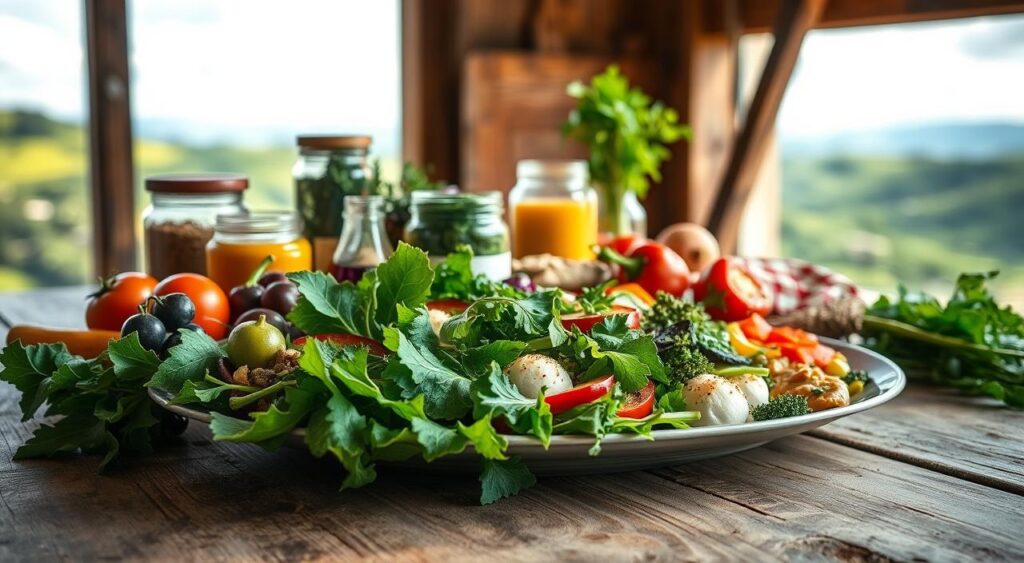Have you ever thought about how your diet affects your liver’s health? The truth is, diet plays a big role in managing fatty liver disease. Chronic inflammation is a major factor in this condition, making an anti-inflammatory diet essential.
In this guide, you’ll find out the best foods for your liver and learn about a diet that fights inflammation. We’ll cover important dietary rules, foods to avoid, and lifestyle changes that help your liver stay healthy.
Understanding Fatty Liver Disease
Fatty liver disease, or non-alcoholic fatty liver disease (NAFLD), is when too much fat builds up in liver cells. This happens without drinking a lot of alcohol. It can cause inflammation and damage, affecting your liver’s health. Knowing what causes fatty liver disease is key to stopping it and managing it well.
What Is Fatty Liver Disease?
This disease happens when fat makes up more than 5-10% of your liver’s weight. At first, it might not show symptoms. But, if ignored, it can turn into liver inflammation or cirrhosis. Knowing about it helps you manage it better and get help when needed.
Causes and Risk Factors
Many things can lead to fatty liver disease. These include:
- Obesity
- Type 2 diabetes
- High cholesterol and triglyceride levels
- Metabolic syndrome
- Excessive alcohol consumption
Knowing these risk factors helps you take steps to protect your liver.
Symptoms to Watch For
Many people with fatty liver don’t show symptoms. But, some might feel:
- Fatigue
- Discomfort or pain in the upper right abdomen
- Unexplained weight loss
Noticing these symptoms is important. Early detection can help manage the disease better.
The Role of Inflammation in Fatty Liver
Understanding inflammation’s role in fatty liver disease is key. Inflammation is a natural defense, but it can harm if it lasts too long. It can damage liver cells and worsen fatty liver disease.
How Inflammation Affects the Liver
Inflammation in the liver causes harm over time. It leads to liver cell damage. This damage can turn into scar tissue, a condition called fibrosis.
If not treated, fibrosis can lead to more serious liver diseases.
Link Between Inflammation and Fatty Liver Disease
Research shows a strong link between inflammation and fatty liver. High inflammation levels make fat build up in liver cells. This creates a hard-to-break cycle.
To fight this, making dietary and lifestyle changes can help. These changes promote better liver health.

Key Principles of an Anti-Inflammatory Diet
Following an anti-inflammatory diet can help manage fatty liver disease and boost your health. It focuses on whole foods that are not processed much and are full of nutrients. Knowing about healthy fats and antioxidants will guide you in choosing the right foods.
Whole Foods vs. Processed Foods
Whole foods are key to a good anti-inflammatory diet. They include fresh fruits, veggies, whole grains, nuts, and lean proteins. Unlike processed foods, which have added sugars, unhealthy fats, and preservatives, whole foods give your body the nutrients it needs to fight inflammation and keep your liver healthy.
Importance of Healthy Fats
Healthy fats are essential in an anti-inflammatory diet. Adding olive oil, avocados, and fatty fish like salmon can lower body inflammation. These fats give your body the fatty acids it needs for cell function and metabolism.
The Power of Antioxidants
Antioxidants are a big part of an anti-inflammatory diet. Foods high in antioxidants, like berries, leafy greens, and colorful veggies, fight off free radicals and protect your liver. This is important for keeping your liver and overall health in top shape.

Essential Foods to Include in Your Diet
Improving liver health starts with the foods you eat. Choosing the right foods can greatly benefit your health. Eating foods that are good for your liver helps it function better and boosts your overall health.
Fruits and Vegetables for Liver Health
Adding colorful fruits and vegetables to your diet is key. Foods like:
- Berries – full of antioxidants
- Leafy greens – rich in chlorophyll, aiding liver detox
- Cruciferous vegetables – like broccoli and Brussels sprouts, support liver enzymes
These foods are packed with nutrients that help repair and support your liver.
Sources of Lean Proteins
Lean proteins are important for muscle and liver health. Here are some good protein sources:
- Chicken – a low-fat meat choice
- Fish – like salmon, rich in omega-3s
- Lentils – a top plant-based protein
These proteins help your body’s metabolic processes and support liver function.
Whole Grains and Fiber-Rich Foods
Whole grains are vital for a healthy liver. They offer fiber, which aids digestion and blood sugar control. Try adding:
- Brown rice – a nutritious grain
- Quinoa – a complete protein and fiber-rich
- Oats – a great source of soluble fiber
These foods are essential for your liver’s health and overall well-being.

Foods to Avoid on an Anti-Inflammatory Diet
To support liver health, it’s key to know which foods to avoid. Staying away from certain foods helps reduce liver inflammation naturally. This promotes overall well-being.
Sugar and Refined Carbohydrates
Too much sugar can lead to weight gain and more liver fat. Refined carbs like white bread and pastries raise blood sugar levels. This can cause more problems. Whole grains are better for your liver.
Trans Fats and Saturated Fats
Trans fats, found in processed snacks and fast food, increase inflammation. They’re bad for anyone with fatty liver. Saturated fats in fatty meats and dairy also worsen liver issues. Healthy fats from avocados and nuts are a better choice.
Alcohol: A Major Concern
Alcohol is a big risk for fatty liver disease. Even a little can stress your liver. Cutting out alcohol is key to improving liver health and reducing inflammation.

| Food Type | Examples | Impact on Liver Health |
|---|---|---|
| Sugar | Sodas, candy, pastries | Promotes fat accumulation |
| Refined Carbohydrates | White bread, pasta, pastries | Increases blood sugar, fat storage |
| Trans Fats | Fried foods, fast food, margarine | Increases inflammation and liver damage |
| Saturated Fats | Fatty meats, full-fat dairy | Worsens liver issues |
| Alcohol | Beer, wine, liquor | Exacerbates liver damage |
Sample Anti-Inflammatory Meal Plan
Creating a meal plan for nonalcoholic fatty liver disease can improve your liver health. It focuses on whole foods and avoids ingredients that cause inflammation. Here are some tasty breakfast, lunch, dinner, and snack ideas to boost your diet.
Breakfast Ideas
Begin your day with meals that boost energy and support your liver. Try oatmeal with fresh berries or a spinach, banana, and almond milk smoothie. These are full of nutrients and can improve your health.
Lunch Options
For lunch, a grilled salmon salad with mixed greens, cherry tomatoes, and walnuts is great. It’s full of nutrients and healthy fats. A quinoa bowl with roasted veggies is also a good choice for your meal plan.
Dinner Selections
Dinner can be a quinoa stir-fry with bell peppers, broccoli, and carrots. Add chickpeas or chicken for a balanced meal that’s good for your liver.
Healthy Snacks and Desserts
Snacking can be healthy too. Try raw veggies with homemade hummus or apple slices with almond butter. Greek yogurt with berries is a tasty treat that fits your meal plan. For more ideas, check out a useful resource on anti-inflammatory meals.
| Meal Type | Options |
|---|---|
| Breakfast | Oatmeal with berries, Spinach Banana Smoothie |
| Lunch | Grilled salmon salad, Quinoa bowl with roasted vegetables |
| Dinner | Quinoa stir-fry with vegetables, Chickpeas or chicken |
| Snacks | Veggies and hummus, Apple with almond butter, Greek yogurt with berries |
Supplements That May Support Liver Health
Managing fatty liver disease can be helped by certain supplements. These supplements improve liver function and reduce inflammation. Omega-3 fatty acids and curcumin are known for their anti-inflammatory effects and support recovery.
Anti-Inflammatory Supplements
Adding specific anti-inflammatory supplements to your routine can be helpful. Omega-3 fatty acids, found in fish oil and flaxseed oil, are good for liver health. Curcumin, from turmeric, has strong anti-inflammatory properties that help with liver detox.
Vitamins and Minerals for Optimal Function
Vitamins and minerals are key for liver health. Vitamins E and C fight oxidative stress, which is vital for liver function. B vitamins and minerals like magnesium support metabolic processes important for liver recovery. Look into anti-inflammatory supplements for liver health to find what works for you.
Lifestyle Changes to Complement Your Diet
Making lifestyle changes for liver health can boost your diet’s benefits. Regular exercise, stress management, and staying hydrated are key. They help your liver work better and improve your health overall.
Importance of Regular Exercise
Regular exercise is great for your metabolism, which helps reduce liver fat. Simple activities like walking or swimming can help. Try to do at least 150 minutes of moderate exercise weekly, and include strength training a couple of times a week. This mix of exercise can improve your liver health and make you feel better overall.
Stress Management Techniques
Stress can harm your liver, so managing it is important. Try yoga, meditation, or deep breathing to relax. Even small steps can help you feel more calm and peaceful. Taking care of your mind is a big part of lifestyle changes for liver health.
Staying Hydrated
Drinking enough water is key for your liver. It helps flush out toxins and supports detox. Drink at least eight 8-ounce glasses of water a day. But, your needs might change based on how active you are and where you live. Staying hydrated helps your body function well, which is good for your liver.
Monitoring Your Progress
It’s important to keep an eye on how you’re doing with fatty liver disease. You should watch how your diet affects your body. This way, you can see if your diet plan is working and make changes if needed.
Tracking your symptoms and what you eat is key. You can use a food diary to note your meals and how you feel. This helps you see how certain foods affect your liver.
Don’t forget to see your doctor regularly. They can check your liver health and adjust your diet plan if necessary. This ensures you’re on the right track.
Tracking Symptoms and Diet
Keeping a food diary is a good idea. It helps you track what you eat and how you feel. This can show you which foods might be causing problems for your liver.
Pay attention to any changes in your body. Fatigue, discomfort, or weight changes are important signs. They help you see how your diet is working.
Regular Check-ups with Your Healthcare Provider
Seeing your doctor often is important. They can check your liver health and how your diet is affecting it. This helps you stay on track and make any needed changes.
These visits give you valuable information about your health. They help you make sure your diet plan is working well for you.
| Monitoring Technique | Description | Benefits |
|---|---|---|
| Food Diary | Document daily dietary intake and related symptoms. | Identifies food triggers and monitors fatty liver symptoms. |
| Symptom Tracker | Record symptoms regularly to observe patterns. | Helps understand the effectiveness of dietary changes. |
| Medical Check-ups | Regular visits with your healthcare provider. | Ensures proper assessment of liver health and enzyme levels. |
Real Life Success Stories
Real-life stories can motivate those facing fatty liver disease. Many have found success by changing their diet and lifestyle. These stories show how determination and hope can lead to better health.
Inspiring Testimonials
People have seen big improvements in their liver health with an anti-inflammatory diet. They feel more energetic and symptom-free. Eating foods like leafy greens and lean proteins has helped them take back their health.
How They Implemented the Diet Plan
Many planned their meals carefully, focusing on whole foods. They made small changes to make it easier. Support from loved ones helped them stay on track with healthier choices.
Keys to Their Success
Staying consistent was key for these individuals. They kept their eyes on long-term goals and enjoyed the journey. Adding exercise and self-care to their daily routine helped them stay on track. These stories show that better liver health is achievable with the right approach.



